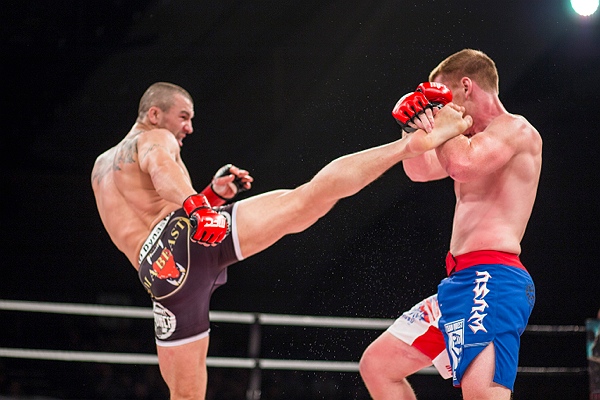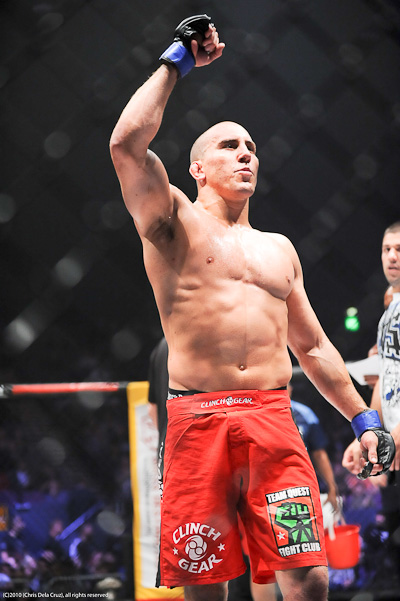Forged by the Grind

Elvis Mutapcic embraces a busy lifestyle. | Photo: Jacob
Bos/Sherdog.com
Elvis Mutapcic does not have a lot of free time. Neither would you if you were an industrial maintenance mechanic working more than 40 hours per week, a newly married man with a baby coming in the spring and a world-class fighter with a 15-2 record who trains three times a day.
Away from his commitments, the 27-year-old Mutapcic prefers a more serene pastime.
Advertisement
Mutapcic will take on “The Ultimate Fighter” Season 7 alum Jesse Taylor in the World Series of Fighting middleweight tournament semifinals at WSOF 7 on Saturday at the PNE Agrodome in Vancouver, British Columbia, Canada. The event’s prelims will stream live to Sherdog.com.
There are not many fighters of Mutapcic’s stature that still hold
full-time jobs outside of the fight game, but then again, there are
not many fighters like Mutapcic. To begin with, he grew up in some
of the harshest conditions imaginable in Sarajevo during the
Bosnian War.
“There’s some extremely good memories and there’s some extremely unpleasant memories,” he said. “It really toughened me up. I wouldn’t trade what I went through for the world, but I don’t think it would be the best thing to relive that.”
Mutapcic became interested in combat sports at a young age.
“I would try to do boxing and kickboxing and karate on a homemade bag that we hung in the front yard,” he said.
Life during the war was tough. It left Bosnia’s economy in a shambles, and Mutapcic’s parents were more concerned with keeping their family fed than bankrolling their child’s interest in training. “When you’re barely just scraping by and surviving on a daily basis and your parents are figuring out how to put the next meal on the table,” he said, “the last priority is going to be some kind of sport they can’t afford.”
When Mutapcic was 14, his family made the move from Bosnia to the United States and joined his uncle in Iowa. It was not an easy transition.
“The adjustment was rough,” he said. “Growing up in Bosnia, there are a lot less rules and if someone makes fun of you, you deck them and don’t get in a whole lot of trouble. So I got in a little bit of trouble with that when I got here, especially being the new kid that everybody wants to pick on.”
Sounds like another MMA story where the new kid learns to adapt to his environs through training in combat sports, right? Nope. What was it that helped the teen-aged Mutapcic get used to the unfamiliar landscape of rural Iowa?
“Girls,” he said with a laugh. “When I started really talking to girls, that’s when my English started getting better and everything started to click in. Chasing girls is the one time when being from another country and having an accent can be a benefit.”
However, Mutapcic was not too busy with the ladies to attend the fights at the infamous and now-defunct Toad Holler in Des Moines.
“I thought, ‘Man, I’d love to do that. I think I can do that,’” he said.

Photo:
Chris Dela Cruz/Sherdog.com
Taylor is on a tear.
“I signed up and I fought and I won,” he said, “and I came back the next weekend and won again.”
After a few bouts, the ghosts of Mutapcic’s childhood began to rear their heads once again.
“I took some time off because my life was really a mess at the time,” he said. “I was scraping the bottom of the barrel and I didn’t have any income. I was trying to be a full-time fighter, and there was no way to make ends meet.”
This was a turning point in the life and career of Mutapcic, who knew all too well from those early days during the war what it was like to be unsure where his next meal was coming from. It was something he never wanted to experience again, so he found himself a job as an industrial maintenance mechanic that he still keeps to this day. With the financial foundation the job provided for him, he went right back to the fight game, secure in the knowledge that no matter what happened, the days of financial insecurity were behind him.
“I have a certain lifestyle that I refuse to live under, and just because I’m a fighter, I don’t want my family to suffer,” he said. “If I have to work two jobs for my family to have a good life, I’m willing to do it. It’s served me well so far, and I don’t want to be that guy who’s living in a one-bedroom apartment and barely making ends meet, knowing in the back of your mind that you have to take a fight even if you’re injured. If I’m injured and I really can’t fight, I have no problem saying it and I still have a way to pay my bills.”
This desire for security and the firsthand knowledge of what it is like to live without it has motivated Mutapcic to keep his day job, at least for the time being, despite the fact that his career as a fighter has advanced to the world-class level. Though committed to his work, he does not short his training as a consequence. Mutapcic may spend 40 hours a week at his day job, but he puts at least an equal amount of time into training.
“It requires a lot of discipline,” he said. “I think it builds character. In the back of my head, when times get tough in the cage, I know that I worked that much harder than everybody else and I’m willing to push even a little harder when I need to.”
Still, even Mutapcic knows he cannot burn the candle at both ends forever.
“I want to be a full-time fighter,” he said. “I’m a workhorse, and so far I’ve been able to [outwork] all the guys who are just full-time fighters. I really wonder what I’d be capable of if I had time to rest during the day instead of work, but, hey, we’ll find out sooner or later.”
That brings us to the upcoming bout with Taylor. It was originally supposed to take place at WSOF 5 in September, but the New Jersey State Athletic Control Board canceled it minutes beforehand. Though many of the details of the incident are still being ironed out, it appears that Mutapcic’s manager was allegedly seen taking prescription heart medication by an NJSACB official in the locker room. The medication was not approved by the commission, and therefore the bout was scrapped. In the ensuing confusion, Mutapcic was among the last to be informed of the situation.
“I still thought the fight was going to go on, so I was trying to stay warm, jumping around in the back, shaking my arms,” he said. “[WSOF officials] asked me to do an interview and I said, ‘OK, what am I doing an interview about?’ I did a live interview and found out on the air that I wasn’t fighting.”
It remains something of a sore subject for Team Mutapcic, but he has seen worse and seems to have taken it all in stride.
“I got to prepare more for my opponent and get to know him better because of it,” he said. “They say everything happens for a reason, and it’s really hard to see it at the time, but maybe so. Maybe it’s a blessing in disguise. I guess we’ll find out on [Saturday] how that worked out for me.”
Mutapcic realizes he is on the cusp of a new phase in his career, one in which it will no longer be realistic to hang on to a day job. His plan is to make that transition soon, when he feels the time is right. In the meantime, he is trying not to think that far into the future or about what lies on the other side of his showdown with Taylor -- a bout with David Branch to become the first World Series of Fighting middleweight champion.
“You can’t look past any opponent, especially a guy like Taylor, who’s been around so long,” Mutapcic said. “You kind of want to peek past it sometimes, but you’ve got to stay on top of it.”
The hardened mental focus Mutapcic has developed allows him to get through the grueling weeks that have become his lifestyle. However, focus on the present does not mean a lack of planning for the future.
“
times get tough in the cage,
I know that I worked that much
harder than everybody else and
I’m willing to push even a little
harder when I need to.
”
In the short-term, more 80-hour work weeks lay ahead. Mutapcic embraces the commitment fully, though even he cannot help but plan at least a little bit of down time.
“Like I said,” he said with a chuckle, “resting is one of my favorite things to do.”
Related Articles







